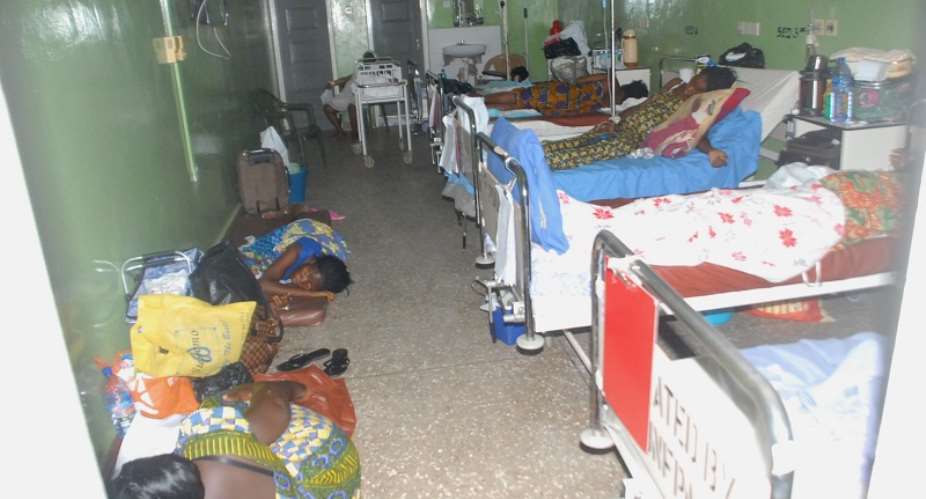Health is wealth, so it is great for the world to remember it in one day (April 9) every year, even as I wish all would remember and live with health in the subconscious 365 days in a year. Ghana is not rich or "comfortable" enough yet to afford uncontrolled morbidity.
For a country just getting promoted to middle-income status, a lot more needs to be done for our development; sickness obviously is not one of them. So we don't have to allow them to happen in the first place. Our youth in particular have to be healthy and energetic to be able to contribute effectively towards national development. How are we helping them in this?
Getting cure from sicknesses could be very affordable to all with policies, but we know it is different on the ground, giving the income levels of the average Ghanaian and the hitherto sidelined Ghanaian corruption also found in the health sector. Health workers demand unofficial payments from patients beyond the National Health Insurance charges.
For the accessibility of health services in Ghana, it could not have posed much problem, given the number of heath centers governments have provided over the years. However, those buildings with or without the medical equipments and personnel do not provide health to Ghanaians. Health workers are refusing postings to the rural and peri-urban areas where their services are needed. Even in the urban areas where they are overstaffed, their conditional services, strikes, private part-time work make their services in the government hospitals near unavailable or unattractive.
Even with the woefully inadequate doctors in the system now, by WHO standards, the health service is costing the nation 15% of her GDP (in 2018) with a doctor-patient ratio of 1:8000 compared to the WHO recommended 1:1320! So obviously much more is needed to satisfy the UN, even if the few health workers were working assiduously. Well governments have tried to bridge the gap despite our "developing" status, even if populist in its implementation.
By the way, did WHO/UN factor in those who patronize traditional/herbal medicine in their computations; obviously, the traditional Chinese medicine would be considered, but what about the Ghanaian's? If it were, then governments would need to develop and include that affordable health delivery system more than they are doing gingerly recently. The herbs are locally acquired almost free of cost, the processing is uncomplicated boiling or alcoholic infusion of herbs barks or roots and so have fewer side effects, among other benefits.
Affordability and accessibility are important in health delivery but PREVENTION of sickness surpasses both; it pays better not to get sick at all than to be healed affordably of any sickness. Is it too much to follow the best practices for healthy living, as in cleanliness, eating well, exercising, drinking potable water, reduced alcoholism, avoidance of insect bites, inhaling of unpolluted air, moderate and drug-free sex, avoidance of accidents etc.
These will make a person healthier than those who attend hospital to receive treatment and cure. These will also make health delivery less expensive. Governments should not be proud to wait to receive the sick and wounded at the "SICK CENTERS" (hospitals) where the sick and injured go; our Health Centers should be receiving healthy Ghanaians for checkups and health counseling. For a middle-income country as Ghana, prevention is better than cure, and a stitch in time saves nine.
https://www.graphic.com.gh/news/general-news/help-govt-fix-discrepancies-in-doctor-patient-ratio.html





 Akufo-Addo commissions Phase II of Kaleo solar power plant
Akufo-Addo commissions Phase II of Kaleo solar power plant
 NDC panics over Bawumia’s visit to Pope Francis
NDC panics over Bawumia’s visit to Pope Francis
 EC blasts Mahama over “false” claims on recruitment of Returning Officers
EC blasts Mahama over “false” claims on recruitment of Returning Officers
 Lands Minister gives ultimatum to Future Global Resources to revamp Prestea/Bogo...
Lands Minister gives ultimatum to Future Global Resources to revamp Prestea/Bogo...
 Wa Naa appeals to Akufo-Addo to audit state lands in Wa
Wa Naa appeals to Akufo-Addo to audit state lands in Wa
 Prof Opoku-Agyemang misunderstood Bawumia’s ‘driver mate’ analogy – Miracles Abo...
Prof Opoku-Agyemang misunderstood Bawumia’s ‘driver mate’ analogy – Miracles Abo...
 EU confident Ghana will not sign Anti-LGBTQI Bill
EU confident Ghana will not sign Anti-LGBTQI Bill
 Suspend implementation of Planting for Food and Jobs for 2024 - Stakeholders
Suspend implementation of Planting for Food and Jobs for 2024 - Stakeholders
 Tema West Municipal Assembly gets Ghana's First Female Aircraft Marshaller as ne...
Tema West Municipal Assembly gets Ghana's First Female Aircraft Marshaller as ne...
 Dumsor is affecting us double, release timetable – Disability Federation to ECG
Dumsor is affecting us double, release timetable – Disability Federation to ECG
